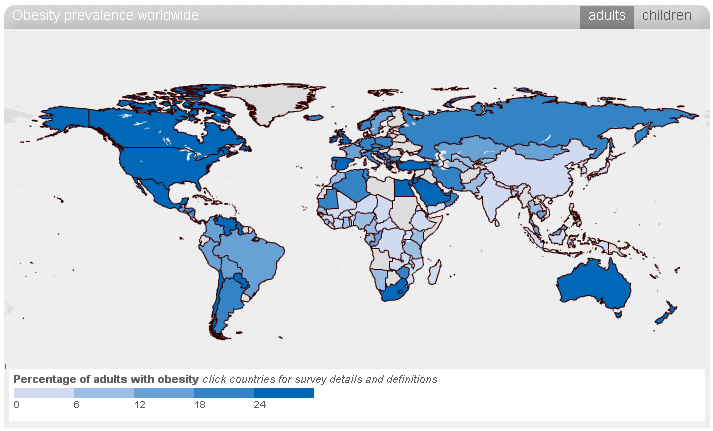As I mentioned in the last post, richer countries tend to be heavier. Let’s take a look at a map (click for source and interactive version):
Right away we see the west as heavier, although that may be a consequence of the relative wealth. Wikipedia has a nice list by country[1].
What immediately jumped out at me was Japan, and much of East Asia in general. Japan has an average BMI of 24, compared with 28 in the US, a disparity much too wide to be explained by the small difference in average personal income.
Shi et al[2] have some interesting analysis of weight change over 5 years in China. Oddly enough, people who ate more meat or sweets didn’t seem to gain more weight. It was people who ate what the authors called a “vegetable-rich” diet. They hypothesized the culprits were some combination of vegetable oil used in frying the veggies, or wheat. Because rice is less calorie dense than wheat-based products (it tends to absorb more water), the same mass has fewer calories. A plausible mechanism to be sure, although far from proven.
Could it be a cultural norm? Maybe. Hawks et al. [3] found statistically significant differences in motivations for eating between the US and Japan in women, but not in men. Eating at fast food restaurants is associated with increased obesity, but simply being near them does not make one more likely to eat at them [4]. That same study found people with kids more likely to eat fast food (presumably due to lack of time), if certain countries have more free time (and hence eat better quality food) that could be a factor. It seems that East Asians are more active in their leisure time[5]. However, they do have less of it[6], so there goes that theory. Guess I’m going to be able to solve this puzzle tonight.
-Jacob
- [1]http://en.wikipedia.org/wiki/File:Obesity_country_comparison_-_path.svg↩
- [2] Dietary pattern and weight change in a 5-year follow-up among Chinese adults: results from the Jiangsu Nutrition Study. British Journal of Nutrition (2011), 105 : pp 1047-1054. DOI: http://dx.doi.org/10.1017/S0007114510004630 ↩
- [3] A cross-cultural analysis of ‘motivation for eating’ as a potential factor in the emergence of global obesity: Japan and the United States
Health Promot. Int. (2003) 18 (2):153-162.doi: 10.1093/heapro/18.2.153
- [4]Are fast food restaurants an environmental risk factor for obesity?
International Journal of Behavioral Nutrition and Physical Activity 2006, 3:2 doi:10.1186/1479-5868-3-2
- [5]Leisure-time physical activity in university students from 23 countries: associations with health beliefs, risk awareness, and national economic development.
Preventive Medicine
Volume 39, Issue 1, July 2004, Pages 182–190
- [6]OECD Factbook 2009. http://dx.doi.org/10.1787/538767417284. See http://www.nationmaster.com/graph/lif_lei_lei_tim_lei_tim_acr_dem_gro_tot-time-across-demographic-groups-total for a slightly more user-friendly viewer.↩


